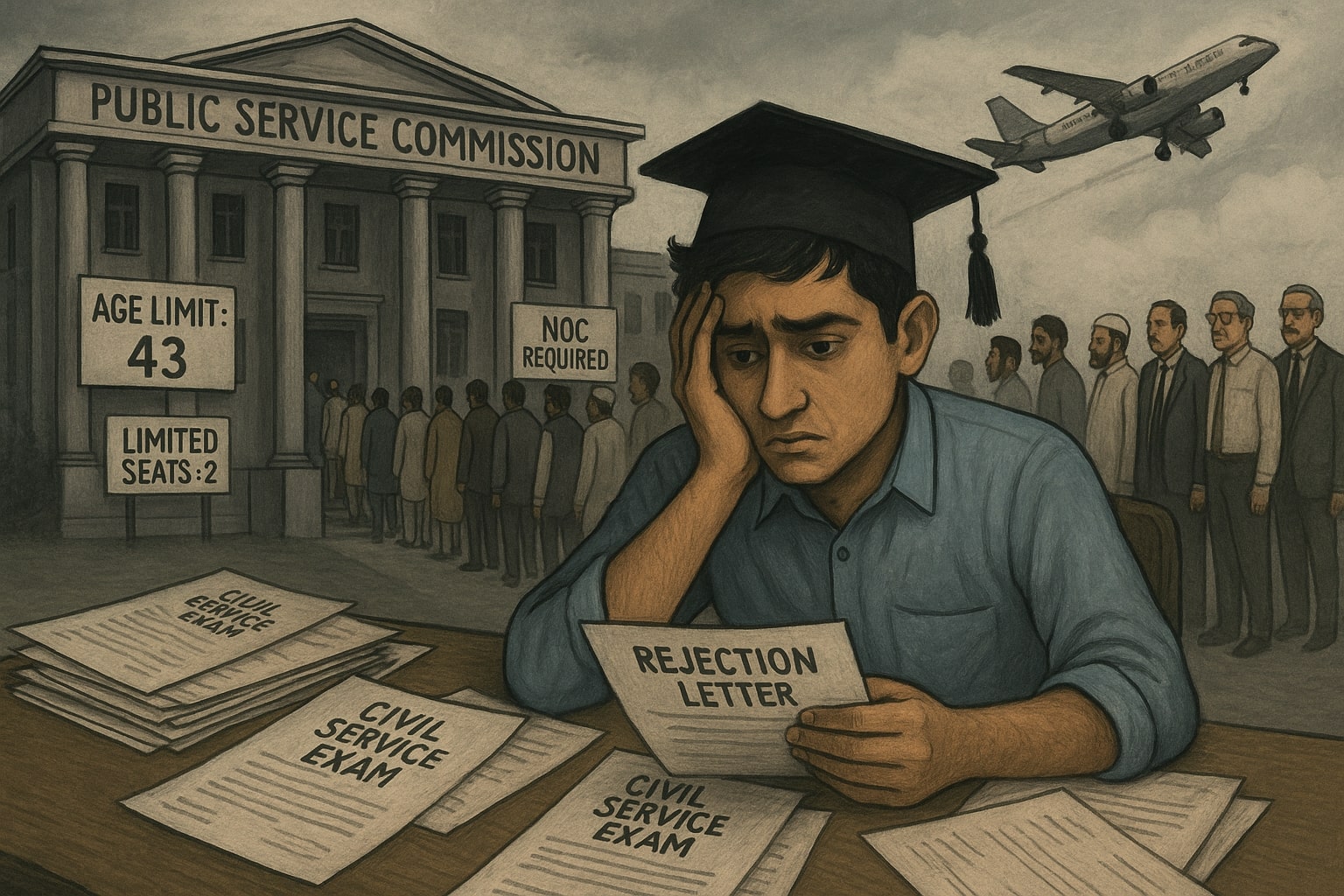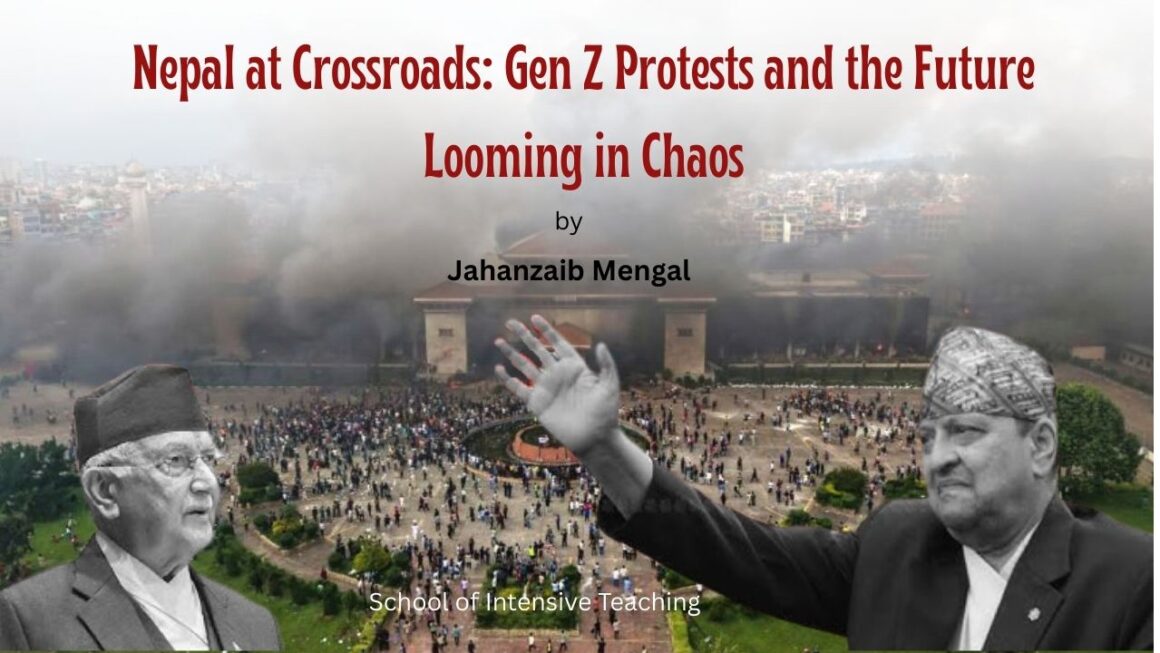Thousands of fresh graduates compete for a handful of posts, only to be edged out by experience, quotas, and a system stacked against them.
Civil service in Balochistan remains a contested dream for many young aspirants. On 2 May 2025, the Balochistan Public Service Commission announced the results of the Provincial Civil Services Examination of 2023, which were later followed by the results of the CCS Special 2023 examination by the Federal Public Service Commission. Many candidates passed while a significant number did not. To understand why many graduates failed, it is essential to look deeper into the issues of Pakistan’s public recruitment system.
The Rush to Compete:
CSS (Central Superior Service) Exams are announced every year by FPSC to give allocation to various deserving candidates while PCS is announced sometimes after three years and sometimes after five years. The nature of both exams is competitive and many aspirants expect to clear the exam to achieve their dream profession. Many students keep preparing for the exams before the announcements and those students include students from different areas, different fields, different ethnicities, different age groups, different qualifications, and even different occupations. Soon after the announcement of the vacancies, the banks are flooded to pay the fee of the challans.
The students trust the transparency and merit and burn the midnight oil to meet the ends.
After this, students sit to start preparing for civil services in Balochistan, making notes, attending lectures, taking peers’ advice, and much more. All of the students trust the transparency and merit and burn the midnight oil to meet the ends.
Why Young Aspirants Are Losing Faith in Civil Service in Balochistan
The categories of the students who apply are many. Some are fresh graduates, some are the ones who have just passed a test and are offering their service in their respective departments, some are elites, some belong to the middle class while many are from the class who have been offering their services as government services for 3-4 years and often the number of years vary. On the other hand, there are groups based on age. One group is people from age 20-30 while others are government servants who surpass the age number 30 or a few are unemployed young people who do not have government jobs. Now the people who are age 20 and beyond till 30 are mostly fresh graduates who don’t have prior experience of attempting any exam for a government job, nor they are familiar with the most accepted pattern of the exams.
Unemployment by the Numbers
According to a labor force survey, the total unemployment rate is 6.3% out of which 10.0% are male and 14.4% are female. Whereas out of the 241.5 million population, 4.51 million are unemployed. Young people in the country, especially those with an age bracket of 15-24, are facing tough job market with an unemployment rate of 11.1%. These statistics are alarming showcasing the country’s employment landscape—highlighting a concerning trend of skilled professionals seeking opportunities abroad. Moreover, Balochistan’s unemployment rate ranging from 4.3% in 2020-21 to 34.9% in 2023-24—marking high percentages in males and females. As per Pakistan’s Economic Survey of 2023-24, the unemployment rate among females has increased from 8.9 to 39.9% in 2023 with a staggering increase in males unemployment from 5.5 to 16.1%.
This rapid increase highlights the high number of unemployed people increasing in Balochistan and there are many reasons behind it, mainly the public sector appeal, the competitive landscape, the unfair advantage, and the recruitment system.
Why Public Sector Jobs Remain Attractive?
In Pakistan government jobs have long held a special appeal among the fresh graduates. These jobs are not seen as stable source of income but also a symbol of prestige, authority, and long-term security. It is, undoubtedly, true of a region like Balochistan, where underdevelopment and limited private sector opportunities, public sector has become the most viable and respective path toward a promising career.
The reality is that they keep trying for years.
The Fresh graduates are drawn to the public sector for several key reasons such as job security, social status, access to power and influence, work-life balance and benefits, limited alternatives (collapse of local industries, lack of entrepreneurship support), inspiration and tradition and therefore the maximum number of youth competes to get a public sector position. Now this race is too complicated because the fresh graduates compete with their seniors, the seniors compete with their peers, the peers compete with their seniors and they all are in competition with the people already working in the public sector who apply to the posts after getting NOC (Non-Objection Certificate) from their respective departments. Unfortunately despite their efforts, the system does not always regard them fairly –a concern that continues to grow as the gap between opportunity and accessibility widens.
The Experience Gap and Systemic Inequality
Besides, it the competitive landscape which is focused on the vacancies and quota system. Whenever FPSC or BPSC announces vacancies for the public sector, Balochistan mostly comes up with one or two positions, and thousands of students apply against those two positions those thousands of students are again the ones from different categories and this system often creates complications, hopelessness, tiring process, and manly brain drain. As a matter of fact, when the results are announced, the positions are taken by the ones who are already working in the public sector as government servants and only 1% of students from fresh graduates make it possible to pass the written.
This system has again excluded fresh graduates from getting positions soon after their graduation. There are many fewer cases when a fresh graduate has gotten a position in the public sector soon after his/her graduation. The experience and familiarity with the system give the people already in the public sector an upper hand and they easily crack the tests which becomes a concern for fresh graduates. Most of the students expect to get at least a public sector job of 16 scale after graduation but the reality is that they keep trying for years. Another alarming point is that the general age limit for recruitment starts from 18-28 and the government of Pakistan provides upper age relaxation up to 10 years for government servants and up to 3 years for candidates of Balochistan. Now the algorithm is that the candidates who generally graduate at the age of 20-25 spend most of the years preparing for the tests reaching the maximum age limit which is 28. This results in brain drain or other side hustles.
The Hidden Cost: Brain Drain
Pakistan Economic Survey 2023-24 reveals a sharp increase in the numbers of professionals leaving the country for abroad ranging from 20,865 in 2022 to 45,687 in 2023—marking a 119% increase. The number of highly qualified individuals also saw a 26.6% jump during the same year—marking the growing number of brain drain.
A total of 862,625 Pakistanis were registered for overseas employment in 2023, a significant increase from previous years, and by April 2024, more than 13.53 million Pakistanis had left the country to work in over 50 nations. These figures not only highlight the number of people who leave the country for work opportunities but also disclose the fact that the students in Pakistan are mostly unsatisfactory due to the assessment and recruitment system in Pakistan. The main reason behind the increasing flaws in the recruitment system is that Pakistan doesn’t regulate internal and external recruitment fairly.
Global Models Pakistan Can Learn From
More pertinently, France has separate recruitment tracks for external candidates and current civil servants. Similarly in the UK graduate schemes like the Civil Servant Fast Stream are exclusively for new graduates and they don’t open them to serving staff. Likewise in Germany, Civil Servants follow rigid paths, and internal movement is controlled, often requiring resignations or special permissions. These models ensure that fresh graduates are not crushed under the weight of unfair competition. They maintain a balance between experience and opportunity –a balance that Pakistan desperately needs.
Though implementation needs time, some implementations should have been done as updating the outdated syllabus of PCS. Other implantations like, separate competitive paths for fresh applicants and internal staff, Graduate –only schemes to ensure young minds are not ignored, limits on how often serving employees can apply for external positions, and transparent promotion systems within departments so that civil servants do not feel the need to re-enter exams for better opportunities.
About the author

Yasmin Sana
Contributor at SIT Ink & InsightYasmin is a freelance writer from Panjgur, Balochistan. She holds a masters degree in English Literature from Sardar Bahadur Khan Women’s University [SBK], Quetta.













